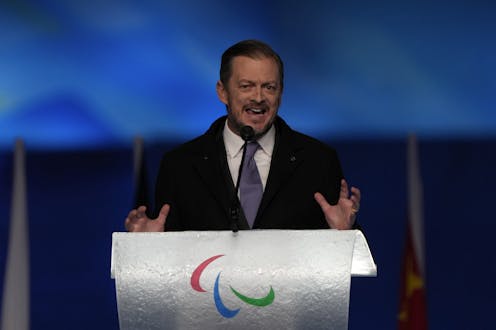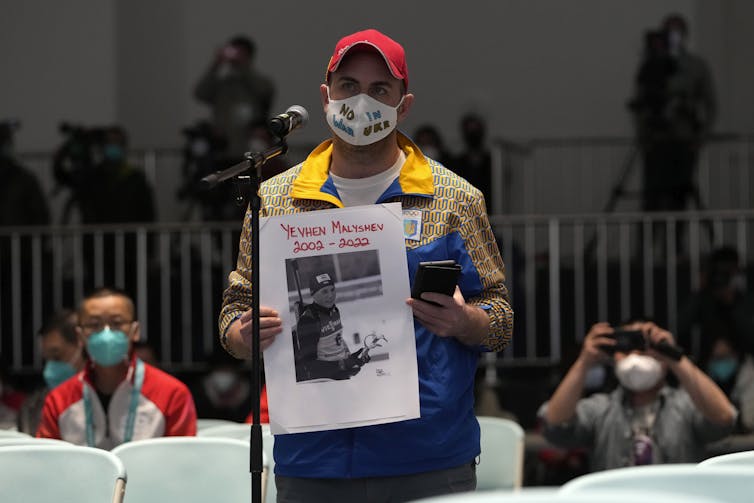
On March 3, the International Paralympic Committee (IPC) announced that all athletes from Russia and Belarus would be barred from competing at the 2022 Paralympics. The decision came less than a day after the IPC announced it was permitting athletes from both countries to compete as neutrals. The IPC’s ban, however, felt forced and hollow.
Make no mistake; it was athlete resistance that forced the IPC to abandon its tolerance of Russia and Belarus. Advocacy groups like Global Athlete and current and former Paralympic and Olympic athletes pressed the IPC to take a stronger stance against Russia and Belarus by joining the majority of teams, leagues and federations in an international sporting boycott.

According to IPC president Andrew Parsons, Russian and Belarusian athletes were not banned for their respective nations’ roles in the outrageous and unjustifiable invasion of Ukraine, but rather to preserve “the long-term health and survival of the Paralympic Movement.”
In fact, the IPC press release contained not a single reference to Ukraine. Parsons’s comments at the opening ceremonies likewise excluded the words Ukraine, Russia and Belarus.
The IPC’s actions aren’t all that surprising. After all, when Putin invaded Ukraine in 2014, IPC head of communications Craig Spence told CBC:
“We’re quite happy to leave the politics to the politicians; we’re competing as we planned.… We don’t want global politics to overshadow what we hope will be a fantastic sporting event.”
But people’s lives can’t be reduced to mere politics and global sporting events can, and do, benefit the authoritarian and totalitarian regimes that play host. China, which was criticized for using the Olympics to obscure human rights abuses, views the recent games as an economic boon. A spokesman for Beijing told the New York Times that the Winter Olympics “brought positive economic benefits and created new sources of growth for the local economy.”
Beyond the IPC’s underwhelming response, the broader sporting landscape is even more complicated, ranging from complete inaction to expulsion, illustrating the politically charged nature of international sport in the 21st century.
International Olympic Committee fails to act … again
The International Olympic Committee (IOC) was quick to condemn Putin and urge the international sports federations to take action, but has refused to take any meaningful action itself. As of the writing of this article, the IOC has not removed the Russian Olympic Committee from the Olympic Movement. Instead, it’s urged international federation events to exclude Russian and Belarusian athletes, passing the responsibility for action off to others. Such a move is unsurprising, given the IOC’s past tolerance for Russian abuses.
In 2008, Putin invaded neighbouring Georgia before and during the Beijing Summer Olympics, sparking a conflict that killed hundreds and displaced thousands. Instead of tossing Russia out of the Games for violating the Olympic Truce, the IOC celebrated the nation, with IOC spokesperson Giselle Davies arguing that the presence of both Russia and Georgia at the 2008 Beijing Olympics reflected the “Olympic spirit and the value of the Games.”
Russia’s invasion of Georgia was a calculated move by Putin, who used the grand and controversial 2008 Beijing Olympics to distract global attention from his assault. He had little need to fret about IOC sanctions, as Russia was already scheduled to host the 2014 Sochi Olympics. IOC criticism of his regime would be tantamount to admitting Sochi was unfit to host. When Putin invaded Ukraine shortly after the Sochi Olympics, violating the truce for the second time in six years, the IOC once again failed to act.
UEFA and FIFA put soccer bans on Russia
The Union of European Football Associations (UEFA) took swift action a day after the Russian invasion began, moving the Champions League final from St. Petersburg to Paris. UEFA also promptly initiated steps to remove Russian government-owned gas giant Gazprom as a sponsor. The move was finalized on Feb. 28, axing Gazprom’s roughly US$40-million deal with the European soccer authorities. The same day, UEFA ejected Spartak Moscow from the Europa League, the second-tier of European championship soccer.
The Fédération Internationale de Football Association (FIFA) has also severed ties with Russia. On Feb. 27, FIFA ruled that Russia’s national team could compete in World Cup qualifiers, but only as the Football Union of Russia and only if they refrained from displaying the flag or playing the national anthem. The following day, after facing a barrage of complaints, FIFA banned the nation from World Cup competition entirely.
Independent clubs have also taken action. FC Schalke 04, which plays in the second division of Germany’s Bundesliga, removed Putin’s ally Matthias Warnig from the team’s board and cancelled its sponsorship deal with Gazprom. England’s Manchester United has also ended its six-year, US$53.7 million sponsorship agreement with Russia’s state-owned airline Aeroflot, with 18 months remaining in the deal.
Red Star Belgrade is still wearing their Gazprom sponsorship prominently on their jerseys, but that’s hardly a surprise. Serbia is the only European nation, other than Belarus, to not sanction Russia for its assault on Ukraine.
Sport matters
Although the IOC and FIFA represent the grandest of the contemporary mega events, the sporting world has seen a broader array of action against Putin and Russia. Following the IOC’s call for international sport federations to ban athletes from Russia and Belarus, most have complied, but some took longer than others. The International Gymnastics Federation (IGF) permitted Russian and Belarusian athletes to compete in Doha last week, providing Russian gymnast Ivan Kuliak the opportunity to stand on the podium with a “Z” — a symbol of support for Putin’s war — affixed to his chest. As of March 7, the IGF has now banned all Russian and Belarusian athletes.
But it’s not just the federations taking action. Formula 1 has cancelled its Russian Grand Prix and terminated the race going forward. All four major professional boxing bodies have barred championship contests in Russia. Finnish ice hockey club Jokerit Helsinki has withdrawn from the Russian-based Kontinental Hockey League playoffs in protest of Putin’s invasion of Ukraine.
The old claim that sports exist in a sort of bubble, beyond the reach of politics, has seemingly been condemned to the dumpster of historical myth and folly. It is time for organizations like the IPC to stop lamenting the intersection of sport and politics, and instead accept this well-established reality going forward, conducting their affairs accordingly. There must be no further reversals.
MacIntosh Ross does not work for, consult, own shares in or receive funding from any company or organisation that would benefit from this article, and has disclosed no relevant affiliations beyond their academic appointment.
This article was originally published on The Conversation. Read the original article.







